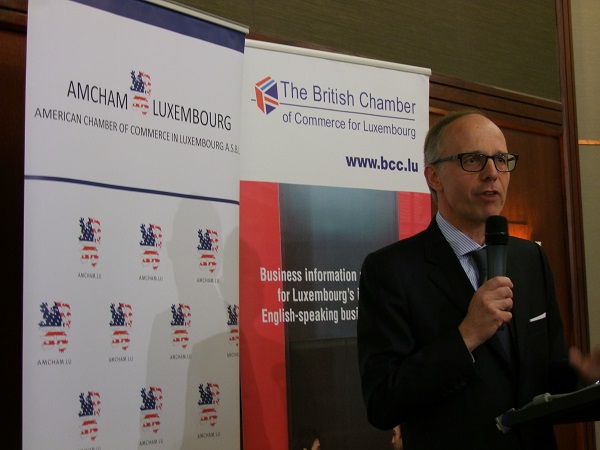
On Monday lunchtime, Amcham Luxembourg held its March ABAL luncheon at the DoubleTree by Hilton in Luxembourg-Dommeldange, in collaboration with the British Chamber of Commerce (BCC) in Luxembourg, the third such joint chamber event so far this year on the issues related to Brexit and the new administration in the US.
The first such event had the British Ambassador to Luxembourg, David Marshall, talking about the British perspective on Brexit; the second event addressed the topic from the perspective of the Luxembourg government, with Luxembourg's Minister for Finance; and today's event saw Luc Friden, a partner at the EHP law firm and former government minister, addressing the issues from other perspectives.
Paul Schonenberg, Chairman of Amcham Luxembourg, addressed the almost hundred-strong attendance and mentioned a number of upcoming Amcham Luxembourg chamber events, including both ABAL lunches as well as evening seminars, as well as the Summer Business Ball being held at the Cercle Cité in Luxembourg city.
He also announced The Languages of Luxembourg, a free online language course on www.amcham.lu which includes 3 levels of courses, each of 500 words in 5 different languages - this is being upgraded to 7 languages with Farsi and Arabic to be included; in 3 months' time a mobile app will also be available in audio form. He also mentioned the opening of a multi-functional International Community Centre in Luxembourg-Bonnevoie.
Guest speaker Luc Frieden, partner at Elvinger Hoss Prussen, acknowledged the role of the international community in the Grand Duchy, specifically the English-speaking community.
The future of Europe and positioning Luxembourg is the latter's remaining part of Europe is part of Luxembourg's DNA. He said that both the UK and the US share the same democratic values as Luxembourg. With the UK, though, it us a "jump into the unknown", with one part negotiating the terms of the departure of the UK from the EU, and the other agreeing a future deal. The complexity will be dealing with the final outcome as the number of subjects to be addressed is extremely numerous.
He said that certain other countries will play a part in these negotiations, e.g. France and their upcoming elections. London's place as the leading financial centre will change; there will be no more passporting facilities (of financial products) via Luxembourg or elsewhere within the EU.
He called for an extended discussion exploring the added value of Europe to us. It has brought us a lot, together, both politically and economically. "Europe is the answer to globalisation" he stated defiantly. As a consequence to Brexit, we should have a discussion on where Europe should move next. Borders are still difficult due to the regulatory framework.
In classifying different groupings, he argued that one group of countries could be those who view Europe both politically and economically; one those that see Europe just economically; one that those see Europe as just political; and the others being outside the EU.
He acknowledged in the political world is very short-term in its outlook, and called upon Amcham and the BCC to look at the issues from both the medium- and long-terms. He described the Eurozone as having its challenges from the start, but called for European dialogue to discuss fiscal union and economic union, being the key to success within the Euroxone.
Luxembourg must be an actor, not an observer, in modelling the future of the EU. To be the best in class, one must be better than all the others.
In terms if taxation, we must become more competitive, re both corporate and personal taxation, by looking at what other countries are doing. Despite growth here, there is still public debt. He praised the current government for its economic policy and keeping spending under control.
Looking at the competitiveness index published by the WEF, Luxembourg should rank among the top 3 of its competitors. For Luxembourg to be competitive, he called for English to be taught in pre-schools. He also called for the extension of international schools here, an investment in the long-term solution for the country. He also called on a new housing policy, including for social housing, to ensure social cohesion which is essential for Luxembourg being prosperous.
The speed at which decisions are made in public authorities needs to be improved; first, it meeds to be measured.
He acknowledged that with his experience in a private law firm, he would now draft laws differently, but it is difficult to move between the private and public sectors; he called for such moves to be easier, including the transfer of pension rights, etc.
He did not rule out a return to politics for himself at some time in the future.








